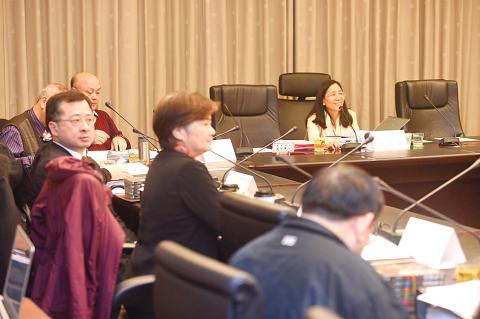Campaigners yesterday protested outside the Presidential Office Building, calling for the implementation of a jury system for criminal trials as a judicial reform subcommittee gathered to discuss possible reform measures.
Headed by former grand justice Hsu Yu-hsiu (許玉秀), the subcommittee focused on a proposal to allow public participation in the judiciary and to have “lay assessors” take part in the criminal justice system, measures which have been long sought after by many members of the public and legal reform advocates.
The subcommittee discussed two proposals: one involving a jury system with 12 jurors, in line with the British and US legal systems; and a participatory jury system, which has more limited public participation of six jurors, in which the jury’s decision can be disregarded on stated opinions given by the judges.

Photo: George Tsorng, Taipei Times
Previous Chinese Nationalist Party (KMT) governments and most judiciary officials favor the participatory system, with the Judicial Yuan and the Executive Yuan introducing legislation in 2012 for its implementation.
However, the proposal has been met with criticism and opposition from most judicial reform advocates, who have called for a jury trial system that gives the jury the power to reach a decision in criminal prosecution cases.
The protest was organized by Taiwan Jury Association, and was attended by members of Citizen Congress Watch, the Northern Taiwan Society, the Taiwan Citizen Participation Association, Taiwan Forever and other civic organizations.
“We are opposed to the position taken by the Judicial Yuan and by many of the members of the judicial reform subcommittee. They advocate the participatory jury system, which is judicial reform by fake means,” said Taiwan Jury Association chairman Chang Ching (張靜), who is a member of the subcommittee that convened yesterday.
“Civic organizations and legal experts have assessed the two systems, and have concluded that only by implementing the jury trial system can true public participation and transparency be realized to reflect the wishes and aspirations of society,” Chang said.
Northern Taiwan Society chairman Chang Yeh-shen (張葉森) said the jury trial system is the only way to end the shady operations of the justice system, which is fraught with personal bias, corruption, influence-peddling and political interference.
Other protesters questioned how representatives of judicial reform subcommittees were chosen, decrying it as a “secretive” operation that caused controversy with the selection of unsuitable members.
They said more than 90 percent of legal reform advocates nominated by civic groups did not make the list, while members from other groups with perceived political leanings and close relationships with the judiciary were selected.
“We represent the true aspirations of the public. Eighty percent of the public supports the jury trial system, according to surveys, but in this subcommittee I am in the minority,” Chang Ching said.

CHAOS: Iranians took to the streets playing celebratory music after reports of Khamenei’s death on Saturday, while mourners also gathered in Tehran yesterday Iranian Supreme Leader Ayatollah Ali Khamenei was killed in a major attack on Iran launched by Israel and the US, throwing the future of the Islamic republic into doubt and raising the risk of regional instability. Iranian state television and the state-run IRNA news agency announced the 86-year-old’s death early yesterday. US President Donald Trump said it gave Iranians their “greatest chance” to “take back” their country. The announcements came after a joint US and Israeli aerial bombardment that targeted Iranian military and governmental sites. Trump said the “heavy and pinpoint bombing” would continue through the week or as long

TRUST: The KMT said it respected the US’ timing and considerations, and hoped it would continue to honor its commitments to helping Taiwan bolster its defenses and deterrence US President Donald Trump is delaying a multibillion-dollar arms sale to Taiwan to ensure his visit to Beijing is successful, a New York Times report said. The weapons sales package has stalled in the US Department of State, the report said, citing US officials it did not identify. The White House has told agencies not to push forward ahead of Trump’s meeting with Chinese President Xi Jinping (習近平), it said. The two last month held a phone call to discuss trade and geopolitical flashpoints ahead of the summit. Xi raised the Taiwan issue and urged the US to handle arms sales to

BIG SPENDERS: Foreign investors bought the most Taiwan equities since 2005, signaling confidence that an AI boom would continue to benefit chipmakers Taiwan Semiconductor Manufacturing Co’s (TSMC, 台積電) market capitalization swelled to US$2 trillion for the first time following a 4.25 percent rally in its American depositary receipts (ADR) overnight, putting the world’s biggest contract chipmaker sixth on the list of the world’s biggest companies by market capitalization, just behind Amazon.com Inc. The site CompaniesMarketcap.com ranked TSMC ahead of Saudi Aramco and Meta Platforms Inc. The Taiwanese company’s ADRs on Tuesday surged to US$385.75 on the New York Stock Exchange, as strong demand for artificial intelligence (AI) applications led to chip supply constraints and boost revenue growth to record-breaking levels. Each TSMC ADR represents

State-run CPC Corp, Taiwan (CPC, 台灣中油) yesterday said that it had confirmed on Saturday night with its liquefied natural gas (LNG) and crude oil suppliers that shipments are proceeding as scheduled and that domestic supplies remain unaffected. The CPC yesterday announced the gasoline and diesel prices will rise by NT$0.2 and NT$0.4 per liter, respectively, starting Monday, citing Middle East tensions and blizzards in the eastern United States. CPC also iterated it has been reducing the proportion of crude oil imports from the Middle East and diversifying its supply sources in the past few years in response to geopolitical risks, expanding